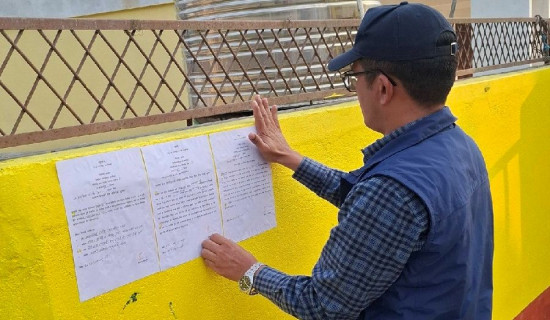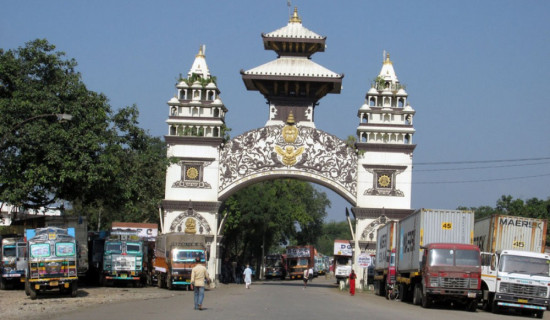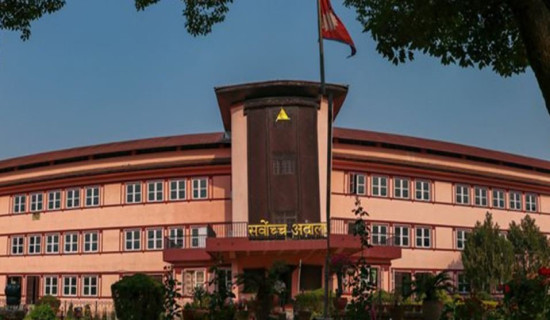- Tuesday, 3 March 2026
News Commentary - COP29: Negotiations need denting politics of fossil fuel
By Narayan Prasad Ghimire, Kathmandu, Nov 14: Amid multiple scientific warnings of rising temperatures, rising emission of greenhouse gases, and the rising suffering people underwent with climate catastrophes from across the globe, the annual conclave on climate change for this year is going on in Baku, Azerbaijan. It began on November 11 and is scheduled to last through November 22.
It is the 29th Conference of Parties (COP29) to the UN Framework Convention on Climate Change (UNFCCC) which is being attended by over 51,000 people spanning from the Heads of States and of governments, ministers, climate scientists, campaigners and youths from the countries which are parties to UNFCCC.
Both in the global leaders' addresses and agenda on the negotiation tables, the most common is the 'climate finance'. For long, the agenda of climate finance has been surviving under different names and phrases but noticeable results are elusive in the midst of global politics of fossil fuel greeted with weather extremes of larger scale and intensity. Last year, it was made vibrant under the term, Loss and Damage Fund, and this year, the New Collective Quantified Goals (NCQG).
NCQG is said to be a more scientific goal on climate ambition and actions which is based on the needs and priorities of the developing and the least developed countries. It has the foundation on the very commitment of the developed countries to extend 100 billion US Dollars a year to the developing and poor countries, which however was claimed to have met in 2022- delaying two years of the target year. As the countries suffering worst from climate change were denouncing the delayed fulfillment of commitment, the climate debates found it vague and non-transparent, thereby setting the NCQG to be enforced from 2025 onwards.
President informs world of Nepal's suffering
President Ramchandra Paudel, who led the Nepali delegation at COP29, also underlined the need of climate finance for Nepal in his address to the world leaders' summit in Baku.
He pointed out the urgency of the operationalization of the Loss and Damage Fund as well. The Himalayan nations like Nepal must be adequately compensated for climate-related loss and damage while the finance for climate action should be in grants, not in loans, according to him.
"As the snow-covered white mountains turn into black rocks, the world needs to recognize that the effects are not limited to the mountainous nations but also extend to the coastal ones," President Paudel reminded.
This statement by President Paudel has finely recalled the world to protect the Himalaya, which is the world's water tower. The threat to the world's water tower is the threat to the sea, which warrants collective actions. Injustice meted out to the Himalayan nations is the injustice catered to the coastal countries. He has voiced for the rights of entire humanity in deed.
In addition to sharing Nepal's good practices like promotion of green energy and increase in forest cover, the President made a remarkable call to the developed and industrialized countries and emerging economies which hugely involve in oil politics and politics of fossil fuel: "The vast resources spent for the arms should instead be redirected for adaptation and mitigation efforts to protect human civilization, and bequeath a habitable planet to future generations."
Like President Paudel there are dozens of other nations condemning the acts, arguing the acts as sheer assaults on nature for individual interests that prefer economic progress to social and environmental values. The island nations have similar plights.
Moreover, the data on the rising emissions clearly indicate that the world is plagued by contradictory practices with a yawning gap between the ambitions and actions. The scientific reports have claimed that our efforts are insufficient and failure to keep alive the 1.5 Degree Centigrade target, a temperature goal set by the Paris Agreement.
If the emerging economies and industrialized and developed countries have played significant parts to cross the planetary boundaries, thereby fomenting climate extremes in the world, how can the poor and LDCs take lead on climate action? It is what dozens of countries have in common to urge and demand the historically culpable parties for easy, fast, smooth and transparent flow of climate finance to the vulnerable ones.
Differing stands, politics of fossil fuel
Similarly, there are differing views between the rising powers and the already developed ones that the latter are arguing and pressing the former that they were also responsible for the increasing emission of GHGs and deserve to assist others. But the rising powers are demanding hefty finance from the developed countries for their climate actions. It was reflected in the previous negotiations as well when two phrases got centre stage: 'phase out' and 'phase down'. The rising economies were for phasing down coal while the already developed ones were for phasing out coal. It had clearly depicted the politics of fossil fuel.
Although several countries have been adopting green energies by gradually transitioning away from use of fossil fuel, the oil politics is not dented at all. Oil is the source of income and economic growth that empowers any country to wield international influence.
Whether it is by the developed and industrialized countries or by the rising powers that are polluting the world and causing climate extremes, those suffering most are evidently the poor and LDCs. So, collaborative and collective bargaining must not wane for the rights and justice. In the multilateral conclave, it (COP29) is a testing time for the LDCs to show a negotiation prowess that reminds those having larger shares to climate change and persuade for compensation. However, it is not a cakewalk either to reach a global consensus amid multilateral complexity.
It is time to observe whether the COP29 would get a success to dent politics of oil and fossil fuel and make headway to green energy and economy.
Attendance and significance
Interestingly, as in the past, the UN event is evaded by many Heads of the States. The Associated Press (AP) has written news 'Earth's biggest polluters aren't sending leaders to the UN climate talks in a year of weather extremes'. It further mentioned, "The world's biggest polluters and strongest economies- China and the United States- aren't sending their top leaders. India and Indonesia's heads of state are also not in attendance, meaning that four most populous nations with more than 42 percent of all the world's population aren't having leaders speak."
However, the agenda of climate change is raised in many other regional and international forums. The UN General Assembly and the Summit of the Future are such high level global events where this issue is raised prominently.
"Climate change is one of the greatest challenges of our time, with adverse impacts that are disproportionately felt by developing countries, especially those that are particularly vulnerable to the adverse effects of climate change. We commit to accelerate meeting our obligations under the United Nations Framework Convention on Climate Change and the Paris Agreement," it is mentioned in the outcome documents of the 'Summit of The Future' held in September this year. It is named the 'Pact for the Future, Global Digital Compact and Declaration on Future Generations.'
Trump 2.0 and climate concern
As the climate negotiations continue in Baku, Donald Trump's victory in the US has alarmed the conservationists, researchers and various blocs alike that US new government's likely withdrawal from the Paris Agreement would pose trouble in coping with climate challenges. Trump's protectionist approach with 'Make America Great Again' slogan might have reinforced this concept.
Meanwhile, 'climate crisis' is mentioned as one of 10 implications of Trump 2.0 by Stephen M. Walt, a columnist at Foreign Policy and professor of international relations at Harvard University. He wrote: "Global progress on this issue will slow, efforts to accelerate the green transition in the United States will be reversed, and long-term efforts to secure humanity’s future will give way to short-term profits. This approach might also cede the high ground of green technologies to China and others, as well as weaken the United States’ long-term economic position, but Trump won’t care."
In Nepal's former Permanent Representative to the UN, Madhu Raman Acharya's view, Trump's comeback would not change the climate negotiation in Baku. But, the policy he would take on global affairs and agendas like climate change would create a ripple. (RSS)










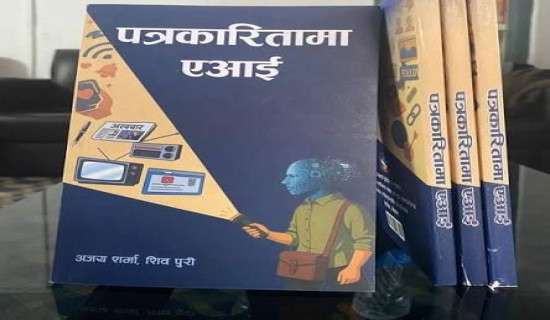

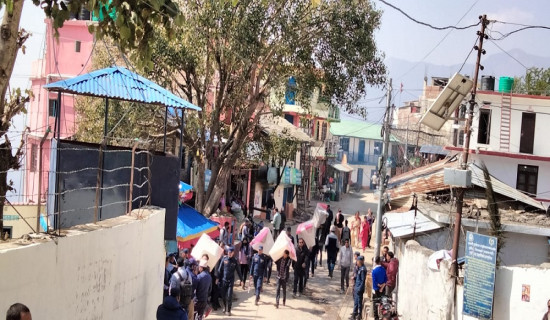
-original-thumb.jpg)
